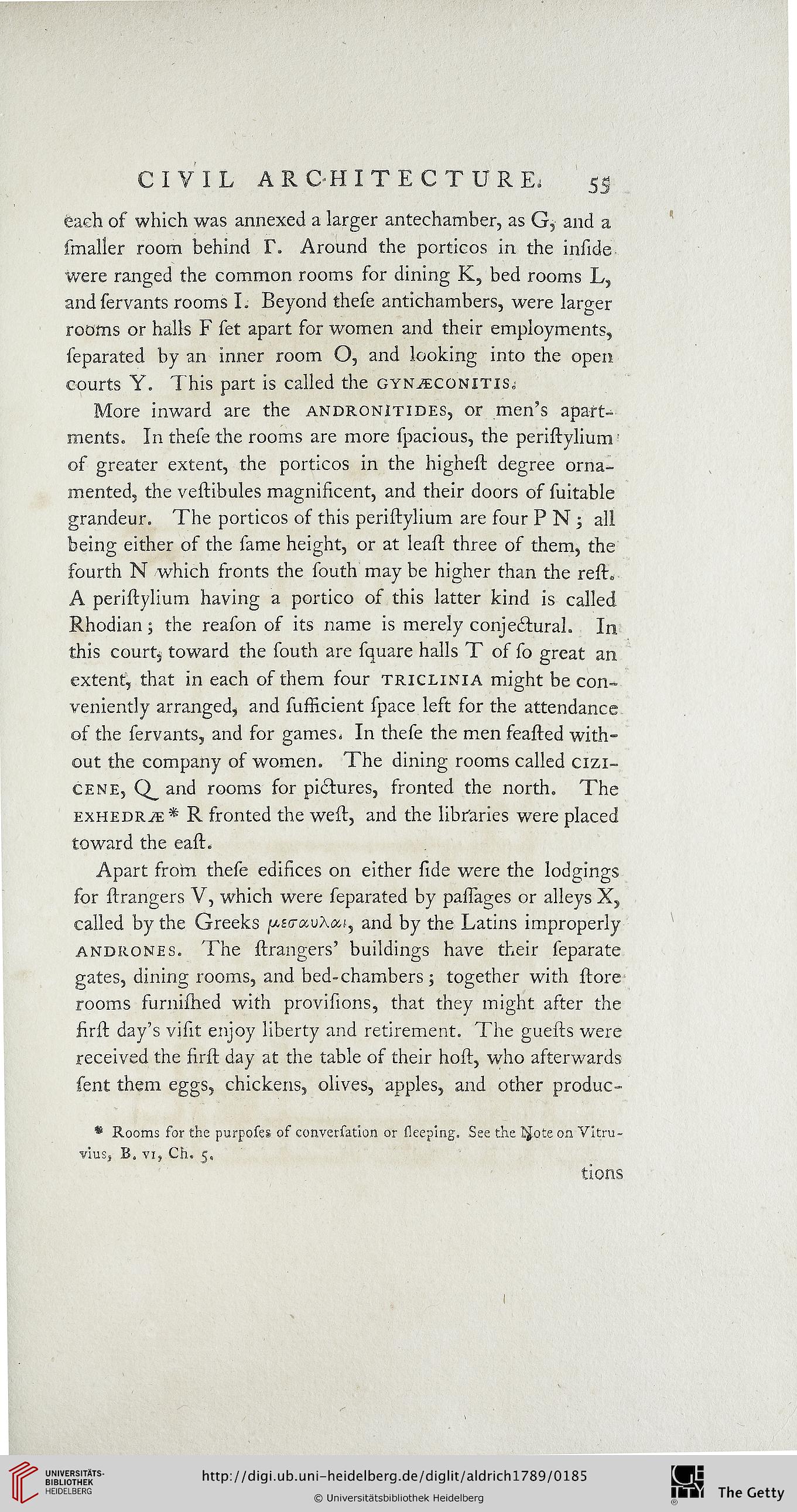CIVIL ARCHITECTURE; 55
each of which was annexed a larger antechamber, as G, and a
smaller room behind F. Around the porticos in the inside
were ranged the common rooms for dining K, bed rooms L,
and servants rooms I. Beyond these antichambers, were larger
rooms or halls F set apart for women and their employments,
separated by an inner room O, and looking into the open
courts Y. This part is called the gynjeconitis.-
More inward are the andronitides, or men’s apart-
ments. In these the rooms are more spacious, the peristylium
os greater extent, the porticos in the highest degree orna-
mented, the vestibules magnificent, and their doors of suitable
grandeur. The porticos of this peristylium are four PN; all
being either of the same height, or at least three of them, the
fourth N which fronts the south may be higher than the rest.
A peristylium having a portico of this latter kind is called
Rhodian 5 the reason os its name is merely conjectural. In
this court, toward the south are square halls T of so great an
extent, that in each of them four triclinia might be con-
veniently arranged, and sufficient space left for the attendance
of the servants, and for games. In these the men feasted with-
out the company of women. The dining rooms called cizi-
cene, and rooms for pictures, fronted the north. The
EXHEDRiE* R fronted the west, and the libraries were placed
toward the east.
Apart from these edifices on either side were the lodgings
for strangers V, which were separated by passages or alleys X,
called by the Greeks sxs<TccvXcciy and by the Latins improperly
andrones. The strangers’ buildings have their separate
gates, dining rooms, and bed-chambers; together with store
rooms furnished with provisions, that they might aster the
ssirst day’s visit enjoy liberty and retirement. The guests were
received the first day at the table of their host, who afterwards
sent them eggs, chickens, olives, apples, and other produc-
% Rooms for the purposes of conversatlon or sleeping. See the Hjspte on Vitru-
VIU$| B, vi, Ch. 5,
tions
1
each of which was annexed a larger antechamber, as G, and a
smaller room behind F. Around the porticos in the inside
were ranged the common rooms for dining K, bed rooms L,
and servants rooms I. Beyond these antichambers, were larger
rooms or halls F set apart for women and their employments,
separated by an inner room O, and looking into the open
courts Y. This part is called the gynjeconitis.-
More inward are the andronitides, or men’s apart-
ments. In these the rooms are more spacious, the peristylium
os greater extent, the porticos in the highest degree orna-
mented, the vestibules magnificent, and their doors of suitable
grandeur. The porticos of this peristylium are four PN; all
being either of the same height, or at least three of them, the
fourth N which fronts the south may be higher than the rest.
A peristylium having a portico of this latter kind is called
Rhodian 5 the reason os its name is merely conjectural. In
this court, toward the south are square halls T of so great an
extent, that in each of them four triclinia might be con-
veniently arranged, and sufficient space left for the attendance
of the servants, and for games. In these the men feasted with-
out the company of women. The dining rooms called cizi-
cene, and rooms for pictures, fronted the north. The
EXHEDRiE* R fronted the west, and the libraries were placed
toward the east.
Apart from these edifices on either side were the lodgings
for strangers V, which were separated by passages or alleys X,
called by the Greeks sxs<TccvXcciy and by the Latins improperly
andrones. The strangers’ buildings have their separate
gates, dining rooms, and bed-chambers; together with store
rooms furnished with provisions, that they might aster the
ssirst day’s visit enjoy liberty and retirement. The guests were
received the first day at the table of their host, who afterwards
sent them eggs, chickens, olives, apples, and other produc-
% Rooms for the purposes of conversatlon or sleeping. See the Hjspte on Vitru-
VIU$| B, vi, Ch. 5,
tions
1





